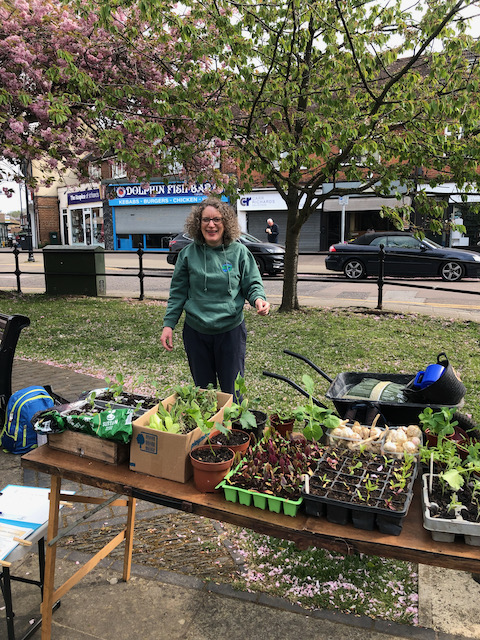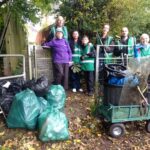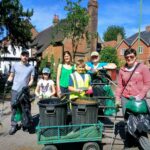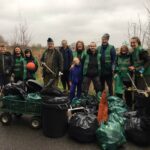Get Abbots Growing
Many of our activities are related to growing local food.
Growing food locally has many advantages for the community and for the environment:
- it reduces the amount of energy we use to travel to buy food
- it reduces the amount of energy used to ship food from where it is grown to where it is bought
- it makes our village more resilient to disruptions in the food supply
- it provides lots of opportunities to develop community networks, for example to share seeds and produce
Spring seedling and seed giveaways
The next seedlings and seed giveaway is on May 11th from 10:30am-1pm in the Millennium Gardens, Abbots Langley.
Since Spring 2020 Abbots in Transition have organised Spring seed and seedling giveaways in the Millennium Gardens in Abbots Langley. These are part of our ‘Get Abbots Growing’ initiative. They are usually held on a Saturday morning in May. All the seeds and seedlings are free. We hope that people who take seeds one year will bring us some seedlings to give-away the next year.

Caring for our environment
Litter Picking
Abbots In Transition organises regular Saturday morning litter picking events around the village, usually followed by a visit to a cafe.
Ban Glyphosate and encourage bio-diversity instead.
Abbots in Transition are calling on the local councils to stop using glyphosate (a suspected carcinogen that is used in the weedkiller ‘RoundUp’), and to pursue other measures of weed control that encourage bio-diversity.
Examples of alternative methods are:
- Leave the grass to grow and treat like a hay meadow
- Actively plant wildflowers
- Allow so-called weeds to grow in the grass. They look pretty and have a beneficial effect on soils and the ecosystem.
- White vinegar, soap and salt mix
- Mulching
- Hand weeding
- Strimming
- Boiling water
- Alcohol
- Grazing animals – goats, ducks and hens are great weed clearers.
Footpaths and our use of the countryside
We have contacted Abbots Langley Parish Council and Herts County Council to make them aware of increased littering, dog excrement and trespassing on landowners land during the Covid-19 pandemic. We suggested a variety of solutions and would like to work with the local authorities to implement these.
- Create Footpath Wardens if these are not already in operation. This would be very helpful in ensuring that Footpaths are being well maintained and any problems can be addressed promptly. Abbots in Transition would like to be part of promoting / supporting such a scheme.
- Promote the teaching of the Countryside Code in schools
- The Countryside Code should be better promoted and given more prominence. Maybe signage is required near prominent footpaths.
- A Public Awareness Campaign about the importance of Nature involving Government, Nature and wildlife organizations
- Ensure signage of footpaths is very clear so that people know where the footpaths are and what is private land. Work in conjunction with landowners.
- Dog toilet on footpaths or around the edges of crop fields is not always being cleared up or is being left near animals e.g in bags tied onto a fence, in trees etc. Safe disposal of dog toilet. Are there enough dog bins? Raising awareness of fines. Signage?
- Litter being left. Are there sufficient litter bins in key locations and are they emptied regularly so that litter is not left spilling over onto the ground?
- Footpaths are sometimes used to dump household, builders and garden rubbish which could cause a danger to wildlife. This is often difficult to remove when it is the responsibility of the landowner. Signage around littering, fly tipping could be useful in hotspots.
- Risk/harm to livestock from dogs. Raise awareness. Work with landowners. Signage?
- Reflecting on the language used about Nature. Nature is seen in a consumerist manner as a provider of services and resources rather than the place in which we live and upon which all life depends.
- What can be done to encourage a more respectful relationship with Nature?
- More education around Nature. Maybe information boards about what wildlife can be found in an area.
- · Create Footpath Wardens if these are not already in operation. This would be very helpful in ensuring that Footpaths are being well maintained and any problems can be addressed promptly. Abbots in Transition would like to be part of promoting / supporting a scheme.
- · If not done so already the Countryside Code should be taught in schools.
- · The Countryside Code should be better promoted and given more prominence. Maybe signage is required near prominent footpaths. · A Public Awareness Campaign about the importance of Nature involving Government, Nature and wildlife organizations,
- · Ensure signage of footpaths is very clear so that people know where the footpaths are and what is private land. Work in conjunction with landowners.
- · Dog toilet on footpaths or around the edges of crop fields is not always being cleared up or is being left near animals e.g in bags tied onto a fence, in trees etc. Safe disposal of dog toilet. Are there enough dog bins? Raising awareness of fines. Signage?
- · Litter being left. Are there sufficient litter bins in key locations and are they emptied regularly so that litter is not left spilling over onto the ground?
- · Footpaths are sometimes used to dump household, builders and garden rubbish which could cause a danger to wildlife. This is often difficult to remove when it is the responsibility of the landowner. Signage around littering, fly tipping could be useful in hotspots.
- · Risk/harm to livestock from dogs. Raise awareness. Work with landowners. Signage?
- · Reflecting on the language used about Nature. Nature is seen in a consumerist manner as a provider of services and resources rather than the place in which we live and upon which all life depends.
- · What can be done to encourage a more respectful relationship with Nature?
- · More education around Nature. Maybe information boards about what wildlife can be found in an area.








